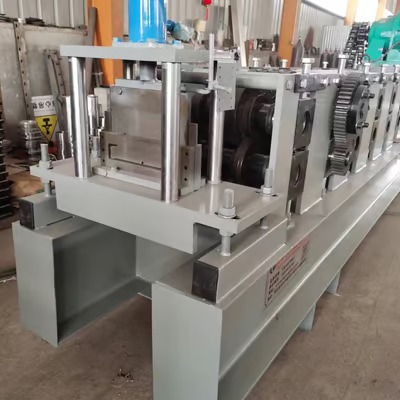Introduction
A metal roll forming machine is a versatile piece of equipment used in various industries for shaping metal sheets into desired profiles. From roofing and construction to automotive and furniture manufacturing, these machines play a crucial role in creating precise and consistent metal components. In this article, we will explore the different aspects of metal roll forming machines for sale, including their working principles, types, benefits, and factors to consider when purchasing one.
1. Understanding Metal Roll Forming Machines
Metal roll forming machines are automated devices that gradually shape metal sheets through a continuous bending process. They use a series of rollers and dies to achieve the desired profile, which can range from simple shapes like corrugated sheets to complex profiles used in architectural and industrial applications.
2. Types of Metal Roll Forming Machines
There are several types of metal roll forming machines available for sale, each designed to handle specific applications and materials. Some common types include:
- Roof Panel Roll Forming Machines: These machines are used to produce metal roof panels of various profiles, such as standing seam, corrugated, and trapezoidal.
- Cold Roll Forming Machines: Cold roll forming machines are capable of shaping metal sheets at room temperature, making them suitable for a wide range of materials.
- Purlin Roll Forming Machines: Purlin roll forming machines specialize in producing C-shaped or Z-shaped purlins, which are structural elements used in building construction.
- Tube and Pipe Roll Forming Machines: These machines are used to create cylindrical or square-shaped tubes and pipes, commonly used in the automotive and furniture industries.
3. Benefits of Using Metal Roll Forming Machines
Metal roll forming machines offer numerous advantages over traditional fabrication methods. Here are some key benefits:
- Precision and Consistency: Roll forming machines provide precise and consistent shaping of metal sheets, ensuring uniformity in the final product.
- Cost Efficiency: By automating the production process, these machines reduce labor costs and increase overall efficiency, resulting in cost savings.
- Versatility: Metal roll forming machines can handle a wide range of materials, thicknesses, and profiles, making them suitable for various applications.
- High Production Speed: With their continuous operation, roll forming machines can produce large quantities of components in a relatively short time.
- Reduced Waste: The precise shaping process of roll forming minimizes material waste, leading to optimal material usage and cost savings.
4. Factors to Consider When Buying a Metal Roll Forming Machine
Before purchasing a metal roll forming machine, several factors should be taken into account to ensure the machine meets your specific requirements:
- Production Capacity: Determine the required production capacity in terms of the number of components or length of profiles needed per day.
- Material Compatibility: Check if the machine can handle the specific material(s) you will be working with, such as steel, aluminum, or copper.
- Profile Complexity: Consider the complexity of the profiles you need to produce and ensure the machine has the necessary tooling capabilities.
- Machine Size and Space: Assess the available space in your facility and choose a machine that fits within your workspace.
- Automation and Control: Evaluate the level of automation and control features offered by the machine, such as computer numerical control (CNC) systems.
- After-Sales Support: Research the reputation of the manufacturer and check if they provide reliable after-sales support, including maintenance and spare parts.
5. How to Find Metal Roll Forming Machines for Sale
There are several ways to find metal roll forming machines for sale:
- Online Machinery Marketplaces: Browse reputable online marketplaces that specialize in selling industrial machinery and equipment.
- Manufacturer Websites: Visit the websites of reputable manufacturers who offer metal roll forming machines for sale.
- Industry Trade Shows: Attend industry trade shows and exhibitions where machinery manufacturers showcase their latest products.
- Local Dealers: Contact local machinery dealers who may have metal roll forming machines available for sale or can assist in sourcing one.
6. Key Considerations for Used Metal Roll Forming Machines
If you are considering purchasing a used metal roll forming machine, keep the following considerations in mind:
- Machine Condition: Inspect the machine thoroughly to ensure it is in good working condition and meets your quality standards.
- Service History: Request the service history of the machine to gauge its maintenance and repair record.
- Upgradability: Check if the machine can be upgraded or retrofitted with new features or tooling to meet your future requirements.
- Price and Value: Compare the price of the used machine with the cost of a new one, considering factors such as age, condition, and included accessories.
7. Importance of Proper Maintenance and Training
To ensure the longevity and optimal performance of your metal roll forming machine, proper maintenance and operator training are essential. Regular maintenance, including cleaning, lubrication, and inspection of critical components, can prevent costly breakdowns and extend the machine's lifespan. Additionally, providing comprehensive training to machine operators enhances their efficiency and reduces the risk of accidents or mistakes during operation.
8. Conclusion
Metal roll forming machines are indispensable tools for various industries, offering precision, efficiency, and versatility in shaping metal sheets into desired profiles. When looking for a metal roll forming machine for sale, consider factors such as the machine type, benefits, compatibility, and your specific production requirements. Whether you opt for a new or used machine, prioritize proper maintenance and operator training to maximize the machine's lifespan and ensure optimal performance.

